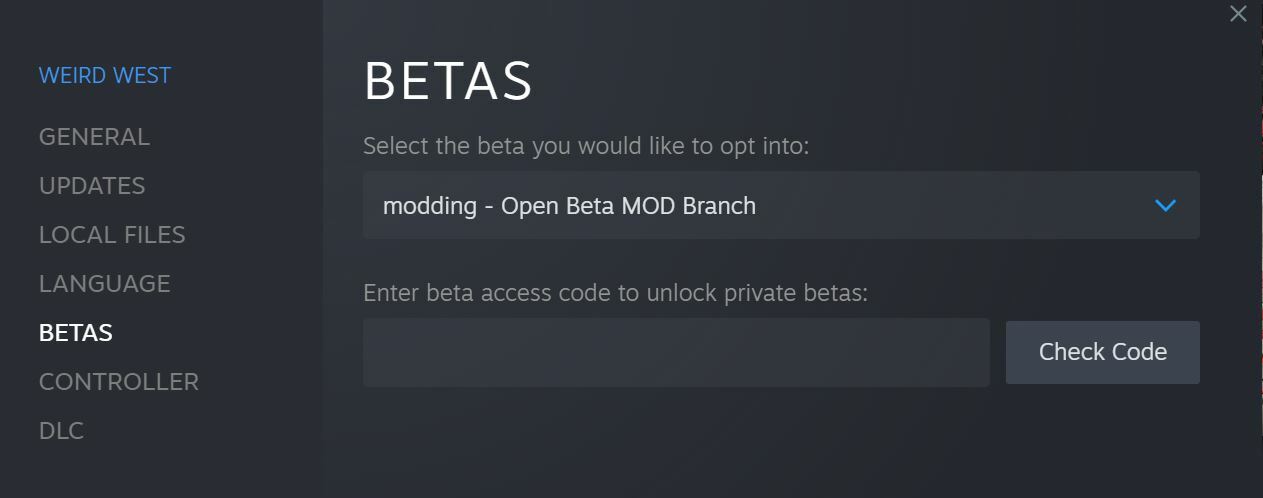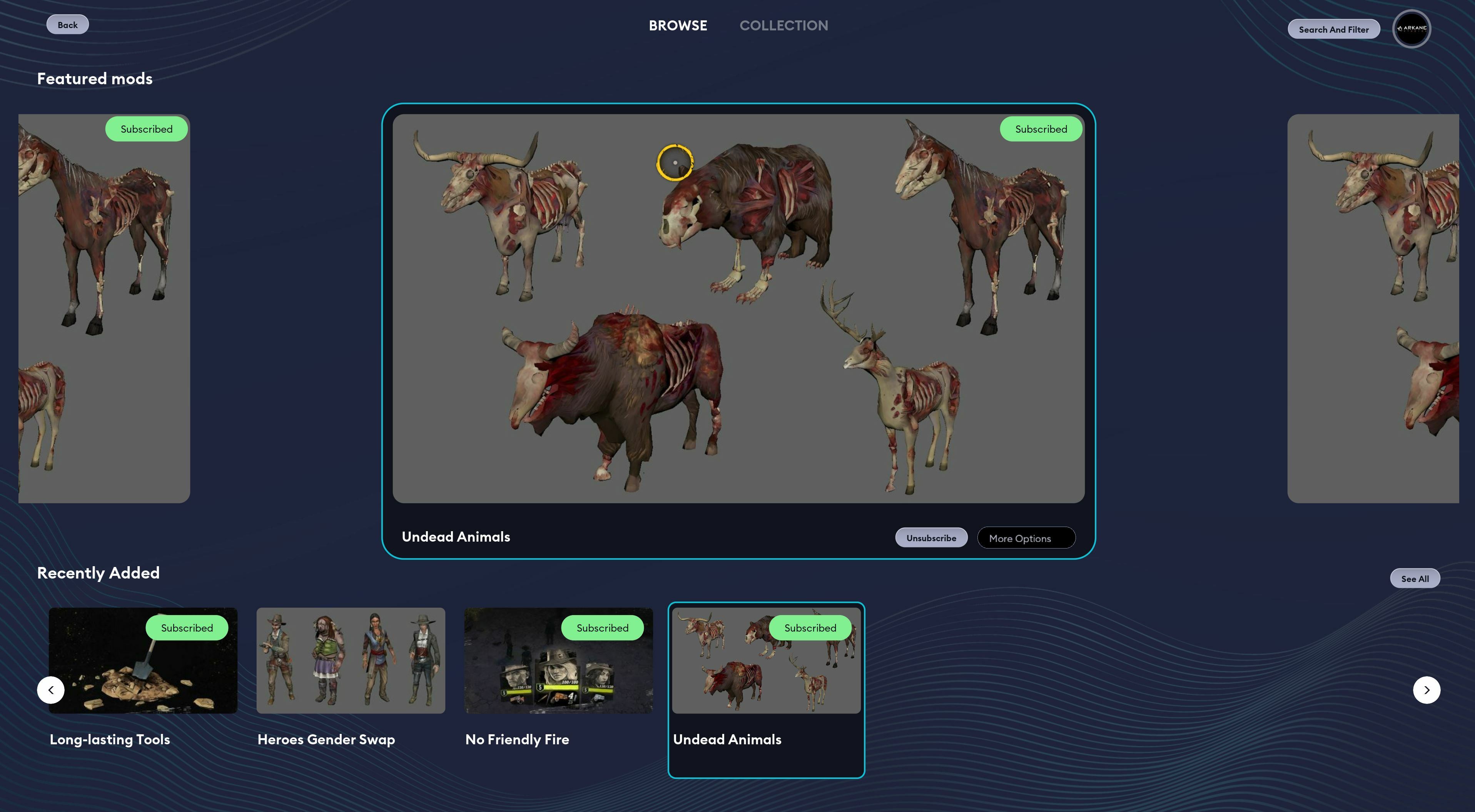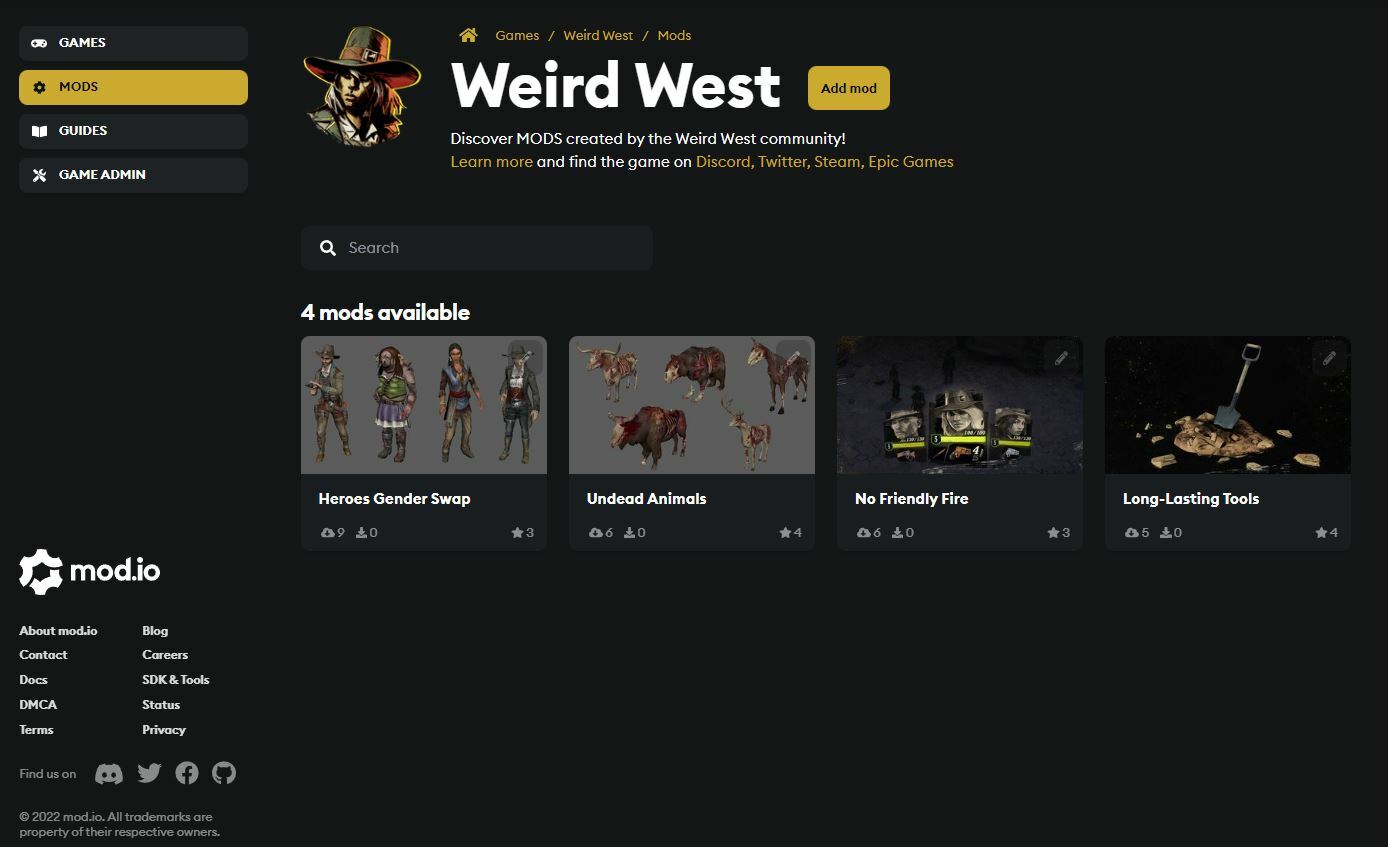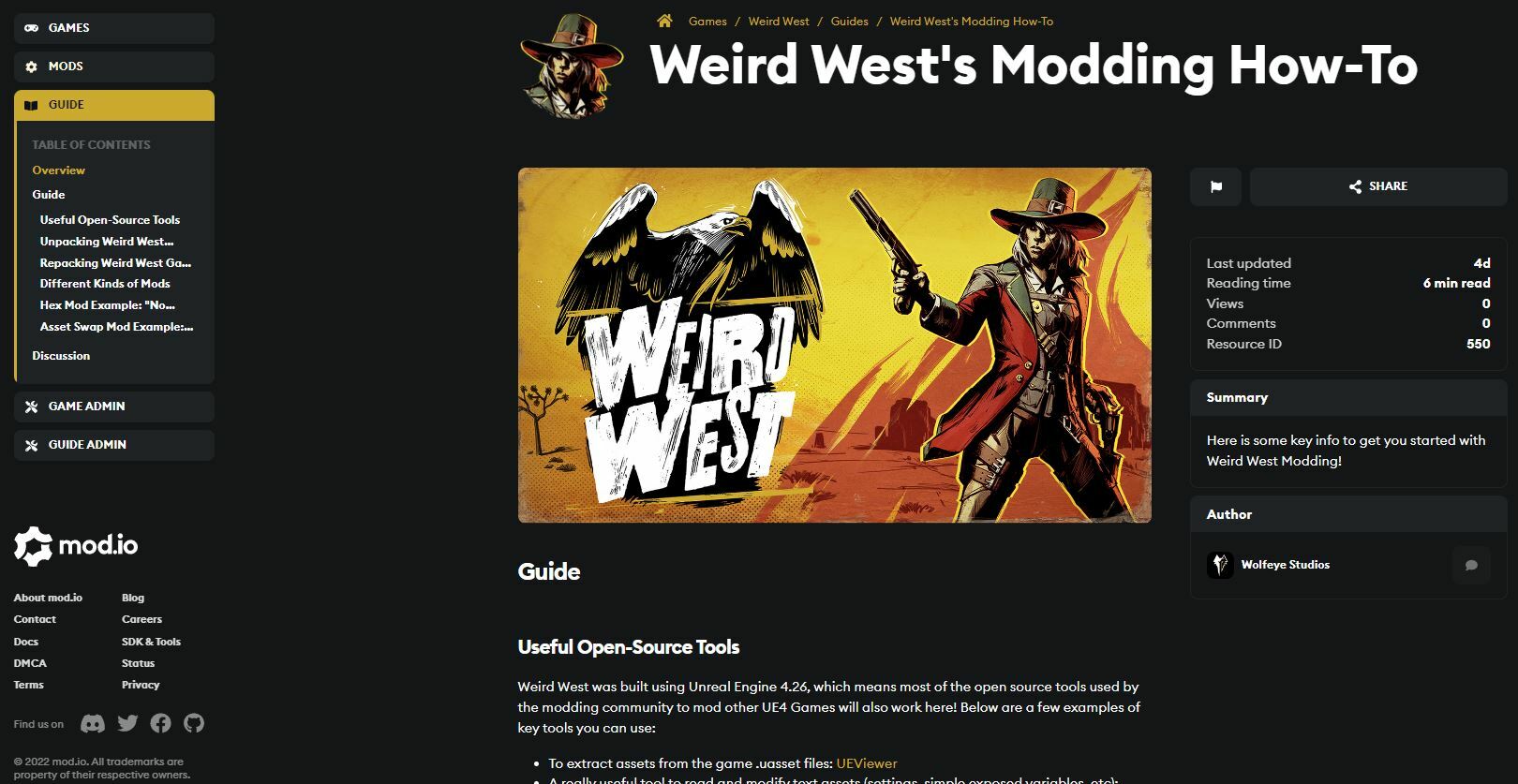-
Welcome to rpgcodex.net, a site dedicated to discussing computer based role-playing games in a free and open fashion. We're less strict than other forums, but please refer to the rules.
"This message is awaiting moderator approval": All new users must pass through our moderation queue before they will be able to post normally. Until your account has "passed" your posts will only be visible to yourself (and moderators) until they are approved. Give us a week to get around to approving / deleting / ignoring your mundane opinion on crap before hassling us about it. Once you have passed the moderation period (think of it as a test), you will be able to post normally, just like all the other retards.
You are using an out of date browser. It may not display this or other websites correctly.
You should upgrade or use an alternative browser.
You should upgrade or use an alternative browser.
Weird West: Definitive Edition - top-down immersive sim action-RPG from Arkane founder Raf Colantonio
- Thread starter conan_edw
- Start date
- Joined
- Jan 15, 2015
- Messages
- 13,164
its part of game pass too.Is this worth $15.99 on sale? I know the consensus isn't great but judging a $39.99 game as a $15.99 game might get a different verdict.
Id say this game is decent enough, it got proper story too. It did scratch seven itch to some extend, althrough its scale is miniscule in comparison. I found it refreshing that you can be a villain and still get best ending
ArchAngel
Arcane
- Joined
- Mar 16, 2015
- Messages
- 21,289
I tried it on gamepass on Xbox, combat controls were so clunky with a controller that it turned into a stealth game for me as I had no way to beat levels going full combat.its part of game pass too.Is this worth $15.99 on sale? I know the consensus isn't great but judging a $39.99 game as a $15.99 game might get a different verdict.
Id say this game is decent enough, it got proper story too. It did scratch seven itch to some extend, althrough its scale is miniscule in comparison. I found it refreshing that you can be a villain and still get best ending
Hobknobling
Learned
- Joined
- Nov 16, 2021
- Messages
- 472
tl;dr:After contributing to webcomics and graduating with a bachelor's in creative writing, Firestine still couldn't see a path to go professional. "I was sort of drifting a little bit trying to make ends meet," she says.
It wasn't until she watched an in-depth interview feature on Laurence Schick, loremaster for the Elder Scrolls series preparing for the launch of Elder Scrolls Online, that she learned that a writing career in video games was a possibility. "He posted a video talking about his job," Firestine remembers, "and how it was sort of his responsibility to make sure all of the games in the Elder Scrolls series used the right lore and was consistent in building a world that was real and living." Not long after, Firestine found a new objective to keep her motivated: "'I want that job,'" she remembers thinking, "Whatever I needed to do to get that -- I wanted it."
At the time, Firestine was working at Austin Community College and enrolled herself into the game design program, earning an associate's degree and getting to know instructor Rich Wilson, who was then Lead Level Designer at Arkane Studios, who recommended her when colleague Raphael Colontonio was looking for writers to help craft his new studio's debut title. "It feels like a series of lucky stumbles," Firestine says.
While Firestine wasn't always into video games, she enjoyed watching her little brother jump and fly his way through the Spyro series. Later on, Firestine took part in communal game nights at her college dorm, where students from multiple floors would meet in the middle common area to play mostly single-player games from such series as Resident Evil or The Legend of Zelda with accompanying commentary from friends. But she wasn't truly hooked until The Elder Scrolls IV: Oblivion. "It was such a true and genuine world," says Firestine, "I'd never seen anything like it. I got immersed so quickly and I just wanted to live in that world as much as possible."
But currently, Final Fantasy XIV is what has truly captured Firestine's heart. "It would be pretty awesome to build a game that had that level of joy and love in it," she says. "I would really enjoy spending a really long period of time with the same set of characters and watching how their stories interact over time and how we can extrapolate new stories going forward. I think going with them on their journey would be a rewarding experience for sure."
Firestine finds inspiration in complicated characters who slowly reveal themselves to the player, specifically citing FFXIV's Thancred. "When you first meet him," she explains "he's sort of introduced as this smooth-talking, compliment-dropping womanizer but you learn relatively early on that he's got a lot of issues with inadequacy and self-esteem."
"[God of War's] Kratos is another great example," she adds. "On the surface he's just this murderous badass but the longer you spend with him the more you realize how much pain he's in and how much anger he has and how he recognizes that he's a monster and has to live with that. I love that duality!"
In order to make complex characters players will gravitate to, Firestine draws upon her history writing fanfiction. "Fanfic writers," she explains, "will take the tiniest detail and extrapolate it into this beautiful fractal of possibilities that the original writers might never have considered." For Firestine, it's eye-opening to be on the other side of the creator/fan relationship, experiencing the satisfaction of "putting those little details in and hoping people connect the dots."
For Firestine, "the ultimate moment of gameplay and narrative cohesion" comes from the original God of War released in 2005. She describes a sequence that requires the player to offer a living sacrifice to open a locked door. Said sacrifice is a caged soldier, who pleads for his life as Kratos pushes him up a ramp to the mechanical altar. Enemies then spawn into the level, halting the players' progress and forcing them to release the cage, letting it slide downward away from their goal, and fight. Upward progress is made in small chunks between battles, while the soldier's cries persist throughout.
"I realized that they're putting that murder in the player's hands," says Firestine. "You are participating in this horrible crime that Kratos is commiting. You're right there with him. It's that moment, for me, that I really understood what Kratos was going through. He had one goal, he had one possible path before him, and he was willing to do whatever it took to achieve that goal even if it meant becoming a monster."
In a myriad of ways, Firestine's first role in the games industry has been an intense learning experience. "A lot of it has to do with my personal struggles with stress and anxiety," she says, "One of the reasons I relate to Thancred from FFXIV so much is I have a lot of issues about being good enough and doing enough to stick around and making sure that everybody likes me."
"It's occasionally been a kind of pitfall for me to fall into," Firestine continues, "'If I just put in 70 hours of work this week then everybody will love me,' but it doesn't work like that -- it really doesn't. Having to disconnect those two desires, those two drives and instincts is very challenging and that's something that anybody with anxiety should think about."
For Firestine, the challenging work put into making Weird West has helped her understand what she finds truly important. "It's sort of forced me to realize that the world is not going to end if I miss a deadline," she says, "It's learning to prioritize - it's learning to communicate with people if things go wrong." She continues, saying, "Collaborating with people has helped a lot. I've learned a lot about trusting my team and trusting myself."
She says that working in the games industry is about being realistic with expectations for yourself and others. "It's occasionally deceiving going into an industry like this and you expect to enjoy yourself all the time," she reflects. "'You're working in games, you're a game writer. You should be thankful.' And I am thankful but there have also been days where it has been so hard and it's up to each individual person to decide if it's worth it."
Firestine's next adventure is with another fully-remote studio called Twin Suns Corp, working on an as-yet-unannounced project that she's looking forward to helping usher into the world.
- qualifications consist of working with unnamed web comics and having a bachelor's in creative writing
- inspired by Elder Scrolls Online, Oblivion, Final Fantasy XIV and God of War
- loves fanfiction
- kissed ass at a community college course where the instructor worked at Arcane and got a job through him
- personal struggles with stress and anxiety and doesn't like working hard
There are 20 different red flags in this interview that should disqualify her from partaking in the industry, but of course she landed the job on knowing a friend of someone and after this project she moves to an extremely well-funded new studio with industry veterans. This type of bullshit is exactly why North American studios are complete garbage. They are hiring the wrong people.
rusty_shackleford
Arcane
- Joined
- Jan 14, 2018
- Messages
- 50,754

how to get hired in the video game industry while ignoring any and all hiring requirements:
step 1. have vagina, dark skin, or know someone to get you hired
that's it
step 1. have vagina, dark skin, or know someone to get you hired
that's it
Bonus points for having a dark-skinned vagina that has intimately known someone in the industry.how to get hired in the video game industry while ignoring any and all hiring requirements:
step 1. have vagina, dark skin, or know someone to get you hired
that's it
Acrux
Arcane
- Joined
- Jul 1, 2019
- Messages
- 1,489
There may yet be hope for this disappointment.
https://store.steampowered.com/news/app/1097350/view/3381666900843922130
Weird West Mod Support Open Beta!
https://store.steampowered.com/news/app/1097350/view/3381666900843922130
Weird West Mod Support Open Beta!
STEAM OPEN BETA BRANCH
Hi gunslingers from all over the Weird West! Mod support is officially coming later this month to Weird West via mod.io, but before we put it into the main build on Steam, the Epic Game Store, and GoG for all players, we wanted to invite curious players to try it out in advance in a short open beta on Steam only.
A "modding" public beta branch is now available on Steam, and if you opt in, the MODDING button on the main menu of the game will be enabled.

SAMPLE MODS
We added four starting sample mods for the open beta so that you have a bit of content to play with and we can make sure all is working at a larger scale. The sample mods can be browsed and installed directly from the in-game MODDING menu:

Please note that those sample mods are to be considered work in progress for the duration of this open beta so they may not all be fully functional yet.
MOD CREATION
Most importantly though: if you are interested in creating mods for Weird West, you can now go ahead and try it! Any mods created and submitted/published during the open beta will carry over once mod support is officially released. So, here's your chance to get a head start and have your mods featured in the game when mod support releases to all players on the week of November 21st!
If you are interested in creating and uploading/publishing Weird West mods, head over to our mod.io page here.

You can also find a guide on How To Mod Weird West here on mod.io

Please note that this is a beta, and as such things are not fully stabilized yet, so you may encounter a few issues here and there. Feel free to post a comment on this thread if you find anything annoying or share your thoughts over on our Discord Server. Our main goal with releasing this early beta is to give mod creators a chance to go hands-on early with the new tools and give them the opportunity to have their creations featured when Patch 1.05 comes out later this month.
A SURPRISE MOD COMING SOON!
Oh... and when we fully release mod support in a few weeks, it will come with a bonus little surprise mod from Joe Wintergreen, which we're sure a lot of you will love. Stay tuned, 'cause that's a big one you won't want to miss--let's just say... fans of a different POV might like it
.
- Joined
- May 19, 2007
- Messages
- 230




There may yet be hope for this disappointment.
https://store.steampowered.com/news/app/1097350/view/3381666900843922130
Weird West Mod Support Open Beta!
Curisous how much you can edit with mods.
There is a lot to work with in the engine
It allows Choices and Consequences, is able to handle a fallout-Like Action RPG game if someone was able to make it.
Child of Malkav
Erudite
Child of Malkav
Erudite
Here's your fucking
first person view, you immershun...people
Here's your fucking
first person view, you immershun...people
Cool. And now when do we get the level design?
Child of Malkav
Erudite
What quality do you expect a small studio with a (very) limited budget to have as it's first game? Honestly I'm surprised it's as good as it is, sure, nothing ground breaking but still. And now, with official mod support? We'll see. They seemed to have adopted the Bethesda strategy: make a somewhat good game, have mod support and let modders extend its quality and lifespan.Cool. And now when do we get the level design?
Ion Storm was a small studio too when they made Deus Ex. I still adore its level design (and everything else).

- Joined
- May 29, 2010
- Messages
- 36,707
Thanks to John Romero, Ion Storm had "unlimited budget."Ion Storm was a small studio too when they made Deus Ex. I still adore its level design (and everything else).
They had their priorities, perhaps they were the wrong ones.
Thanks to John Romero, Ion Storm had "unlimited budget."Ion Storm was a small studio too when they made Deus Ex. I still adore its level design (and everything else).
They had their priorities, perhaps they were the wrong ones.
I'd say the Austin studio had its priorities right. I also don't think Romero's rockstar status extended to the Austin studio as a shield.

- Joined
- May 29, 2010
- Messages
- 36,707
He was the reason they had the budget. https://www.pcgamer.com/the-history-of-ion-storm/I'd say the Austin studio had its priorities right. I also don't think Romero's rockstar status extended to the Austin studio as a shield.
Wilson states he was on holiday when the deal was officially signed. When he got back, it had changed dramatically. Ion Storm was now into Eidos for not three games, but six. “[Eidos] really wanted to lock these guys up, because they were investing in what would help start the company,” he says.
The other founders told Wilson not to worry. They could halve the workload by creating a second studio to make three of the six games (what would ultimately become Ion Storm Austin). Besides, the whole point of Ion Storm was ‘Design is Law’. The issues that had plagued id during Quake’s three-year development wouldn’t be a factor as Ion Storm would use tried-andtested tech. The games would be built in no time.
...
As for Romero, he describes his time at Ion storm as a “tremendous learning experience”. He says, “It was far from perfect, but ultimately, making games isn’t always about having crazy success. Sometimes, games and companies don’t turn out to be what you hope they will be, and you do the best you can.”
And even if we adopt the dimmest view of Ion Storm Dallas, if we focus on all the mistakes and believe every internet rumour, there is one thing that John Romero got right. “He wanted to help me make a game and was willing to do whatever it took for me to make whatever game I wanted to make,” says Warren Spector. “He made some big promises to me, and lived up to every one of them.”
The game in question was Deus Ex, created by Ion Storm’s second studio, Ion Storm Austin.
...
Had it not been for the intervention of John Romero, Deus Ex would have become a Command & Conquer game. In 1997, Warren Spector left Looking Glass “when I realised the continued existence of the Austin Studio was going to jeopardise the existence of Looking Glass overall”. Despite creating Thief and System Shock, Looking Glass was struggling and could no longer sustain a second studio so far removed from its original office in Cambridge, Massachusetts. “I didn’t want to be responsible for that,” says Spector. “I told Paul Neurath, the founder of Looking Glass, that I’d be fine. I’ll find another deal.”
Spector took with him a design document he’d been toying with since his days at Origin Systems. The working title was ‘Troubleshooter’. “I wanted to make a game where players got to solve problems the way they wanted to. Fighting, sneaking, talking, doing whatever they wanted,” Spector says. “And so I dusted that off, and kind of adapted it to a Command & Conquer setting and was going to do the Command & Conquer RPG. I was close to signing a contract when I got a call from John Romero.”
Romero asked Spector to join Ion Storm as its fifth partner (the other four being Romero, Tom Hall, Todd Porter, and Jerry O’Flaherty). “I really wanted him to join Ion Storm so he could make the game of his dreams. It didn’t matter to me what kind of game it was because it was going to be great—it’s Warren,” says Romero.
Spector replied, “It’s too late, I can’t, I’m working on this Command & Conquer thing.” Romero told him not to sign anything. He said he would make the 200-mile drive from Dallas to Austin and change Spector’s mind. This is exactly what he did. “I told him he could hire a team, make whatever he likes, have as much money as it took, and take as long as he needed,” Romero says.
It was an offer Spector couldn’t refuse. But he had a condition. He would join Ion Storm as the fifth partner, but he refused to work in Dallas. In fact, he refused to work anywhere but Austin. “In Texas there’s four major cities. There’s Dallas, Houston, San Antonio and Austin, and the only one I would ever consider living in is Austin,” Spector says. “When [Romero] came down that day to try to convince me, part of the deal was, I’m not moving, I’m not going to work in Dallas, and he was okay with that.”
...
At the same time, not everyone at the Dallas studio was happy with how things were panning out at Austin. Jerry O’Flaherty, who was the art director for Ion Storm as a whole, had sent several artists down to Austin to work on Deus Ex. “These artists would report back to Jerry about various goings-on within the studio,” says Romero. O’Flaherty was close friends with another of Ion Storm’s founders, Todd Porter, and according to Romero, Porter didn’t like what he heard about how things were progressing at Ion Storm Austin. “This led Todd to call for the cancellation of the game, or him wanting to go down to straighten things out.”
Romero, however, acted as a buffer between Austin and the more sceptical voices within Dallas. “I told Todd to leave them be, and we would not be cancelling the game, ever,” Romero says. “I had to put my foot down several times during the Deus Ex timeline. I had the utmost confidence in Warren and Harvey.”
Yes, but they didn't blow the budget out of proportion, did they? My point was they had a tight level design team for DX and it worked out. Detail was low and blocky, but who cares? No reason why WolfEye couldn't do the same.
Child of Malkav
Erudite
Unless we're talking numbers all this is pure speculation. We don't know (at least I don't, maybe it's been posted somewhere) what budgets these games had let alone the different allocations for level design, gameplay, story etc.

- Joined
- May 29, 2010
- Messages
- 36,707
Like I said, they didn't have Warren Spector's unlimited budget that he had thanks to John Romero and they had different priorities (possibly wrong ones).Yes, but they didn't blow the budget out of proportion, did they? My point was they had a tight level design team for DX and it worked out. Detail was low and blocky, but who cares? No reason why WolfEye couldn't do the same.
onemananadhisdroid
Augur
I had more fun with this than with Elden Ring. My main gripe actually is that they didn't make the characters more diverse to play. Most of their abilities directly related to combat; every character being able to use all the weapons (I artificially limited myself to what they were initially carrying/was logical); and damn Pig Man not being molested as in the first town you go to everywhere (wasted opportunity to turn the game upside down).
Also, guy's inquiring about the next game being first person or not. Results as expected. I'll gladly be in either way.
Also, guy's inquiring about the next game being first person or not. Results as expected. I'll gladly be in either way.
Last edited by a moderator:
GentlemanCthulhu
Liturgist
- Joined
- Aug 10, 2019
- Messages
- 1,479
The FPS mod really transformed this game for me. It technically features all of the immersive elements i'd want out of a game like this, but the perspective really put me off. I'm surprised to see how well it works.







![The Year of Incline [2014] Codex 2014](/forums/smiles/campaign_tags/campaign_incline2014.png)


















